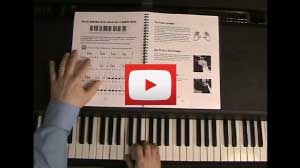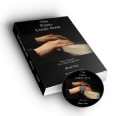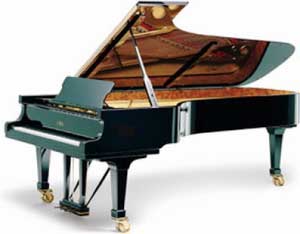Common Piano Questions Answered
If your piano question isn't answered here, use the form at the bottom of the page to ask your question, and I'll answer it as best and quickly as I can!
Q. What is a good electronic piano/keyboard for beginners?
A. It may depend on a few factors. A basic 61 key keyboard will have enough keys to do most beginner's lessons. Try to get one with "touch-sensitivity," which is the ability to play louder when you play the key more forcefully. "Weighted action" plays and feels more like a real piano, but is usually found on 88 key instruments, and adds cost. The quality of the piano sound, and the quality of the built-in speakers also affects the cost of the instrument. The most expensive electronic piano/keyboards look like a small baby grand piano, and cost thousands of dollars.
Q. What is the difference between a grand piano and an upright piano?
A. A grand piano has its strings laid out horizontally, and an upright, vertically. Because of that difference, the action (keys, hammers and related mechanism) is designed differently and feels different to the player. Many beginners may not feel the difference in the touch. Most grand pianos will have longer strings and larger sound boards than vertical pianos, which means better overall tone. Also, grand pianos can cost much more than vertical pianos.
Q. What piano is good for beginners?
A. Beginners can start on a keyboard, then if they think they will stick with it, they might graduate to a piano. A good quality vertical piano can be had for a small investment, and sometimes for free (you might have to move it, though).
Q. What questions should I ask when inquiring about used a piano?
A. First, what brand is the piano? Some brands are better than others, but of course that isn't the only criteria. Second, what size (height) is it? A larger piano tends to sound more full, with better bass. Third, what is the age/ condition? Do all of the keys work? Any broken strings? Often older pianos aren't well cared for, unless they of the better brands, in which case it may have been reconditioned, or taken better care of overall. Next, has it been played and tuned regularly? This is not a deal breaker, because often a good piano can sit idle for years, but still be a reasonable instrument. Other questions: where was it stored, what floor is it on, what color/shade is it, etc. It is a good idea to have a piano tuner, or maybe your piano teacher look at the instrument, especially if it is a big investment for you.
Q. How often should a piano be tuned?
A. A piano should be tuned at a very minimum at least once a year. Even if it is not played, the changes in the weather (humidity level) will affect the tuning. The more you play the piano, and the more advanced your playing becomes will probably cause you to want it to be tuned more often. Most of my intermediate students prefer to have their pianos tuned twice yearly. I tune my own piano thoroughly about every six weeks, and "touch up" the tuning every other week or so. (I've become picky).
If it sounds out of tune, get it tuned. You'll enjoy playing the music much more!
Q. Is it necessary to have three pedals on a piano for a beginner?
A. No. A beginner really only has to use the sustain pedal, the pedal on the right. Many vertical pianos have only two pedals, the sustain pedal (on the right) and the "soft" pedal. Occasionally, some uprights have a third pedal which is a "practice" pedal, which is a locking "soft" pedal. (So you don’t disturb the neighbors!) On some verticals, the third pedal is a dummy pedal, only for show. On a grand, the third pedal (in the middle) is the sostenuto pedal, for sustaining only certain notes of the player's choosing.
Questions About Learning Piano and Piano Lessons
Q. How do I get started learning to play piano?
A. First, you need an instrument to practice on. At the minimum, a keyboard with 61 full-size keys and a decent piano sound can get you started. Then you should find a good teacher, or a good piano method that is age appropriate. (If you're an adult, don't use a child's piano method book.) Then you need to carve out some practice time from your busy schedule, and plan to stay committed. Then start with lesson one....now you're on your way!
Q. How long does it take to become a good piano player?
A. "Good" is a subjective term, so this is hard to quantify. Everyone learns at their own pace, but the more you practice, the faster you improve. A professional concert pianist touring the world has probably put in around 10,000 hours of intense practice. Which equates to practicing many hours everyday for many years. You may not have the desire to be a concert pianist, but if you want to be good, you have to practice. A lot.
Q. At what age should children begin piano lessons?
A. Many children are drawn to the piano as young as age two, and can be shown simple things to play, especially if the parent is a pianist. Formal piano lessons require that the student can stay focused during the lesson, which is typically a half hour long. For some four and five year-olds this can be an eternity, but others can keep their minds on the lesson at hand. Usually by age six, any child is capable of staying focused during piano lessons.
Q. What are some good piano lesson books for children?
A. I have used the Alfred piano series for many years, with great success. I have used others too, including the Bastien series, which is very similar to the Alfred books. The Faber books are quite good also. I am not a fan of the Thomson books, though. My theory is, if you want the child to quit playing, give them the Thomson books.
Q. How many hours should I practice piano each day?
A. This depends on what your goals are. For the typical beginning student, a half hour to an hour is usually sufficient to keep progressing in their lessons. As the student gets more serious, they may find that 30 to 60 minutes is not quite enough. For someone who wishes to become professional, they should practice as much as they can fit into their daily schedule. For others for whom it is only a hobby, then practice as much as feels good for you.
Q. How can I learn piano without a teacher?
A. Learning with a teacher is the best way to go, but there are method books that you can follow, including The Piano Guide Book, (and Piano Guide Lessons.com) featured on this website. The Piano Guide Book is unique in its approach to teaching adults how to play piano. It teaches you the notes, chords and music theory, plus you can watch the free videos where everything is carefully shown for you. In that way, it is like having a teacher in your own home.
Q. How long does it take to learn piano if I already can read music?
A. This depends on whether you can read piano music which is in two staves. Having said that, if you already have reading skills, then piano will make sense to you, because it is such a visual instrument in how the notes on the keyboard relate to the notes on the staff. But there is still the physical aspect of playing the instrument, which of course means practice!
Q. Am I too old to take piano lessons?
A. No one is too old to learn piano. Granted, some old dogs have a harder time learning new tricks, but if you have the desire and the time, go for it! I have had students over 80 who decided to learn to play piano, and enjoyed themselves immensely.
Q. Do I need piano lessons to become really good?
A. You don't have to take piano lessons to become really good, but having a good teacher will show you how to play most effectively, how to learn faster and correctly, how to use finger technique to your best advantage, and show you "short cuts" that you wouldn't find on your own. I was self-taught when I began to play piano, and though I was having lots of fun, I could have progressed much more quickly if I had a teacher. A teacher can show you what to practice, and more importantly, how to practice.
Q. What is the best piano method for beginning adults?
A. Well, that's easy. The Piano Guide Book Series (and Piano Guide Lessons.com) is the best, most comprehensive and thorough method for adults. I wrote The Piano Guide Book Series because the other methods out there were okay, but something was missing, especially for really motivated adults. Many of the methods for adults are "dumbed down" for the widest audience, and largest age group, including teenagers. Often these books use many of the same musical examples as in the children's piano books, but "dressed up" to look more "adult." The Piano Guide Book Series gives the student the tools and exercises to progress quickly, plus there is lots of music to play in many styles of music, from classical, jazz, blues, folk and rock. Also, you can learn about music theory, which helps you understand the "why" of music. The book and videos make the Piano Guide Book Series the most complete and unique piano method for adults available.
Q. What is the best way to memorize all of the scales on the piano?
A. Practice them! Over and over. Daily. I still play scales every time I sit down to practice. You can always improve them, play them faster, more cleanly, more evenly. Scales are your friend. You will always use them, maybe only parts of the scales, but you will use them. Scales teach your fingers how to get around on the keys. Start by memorizing the scales that start on the white keys, then move on to the black keys.
Q. What's the best way to practice piano?
A. First, find a time of day that you can devote to piano practice. I practice every weekday morning, right after breakfast. Start by warming up with scales to get your fingers moving. If you are taking lessons with a teacher, try to review earlier music, with the goal of being able to play right through the pieces comfortably. Next, start working on your new lesson material. I like to play all the way through a piece the first time, to get an idea how it sounds. Then I will work through section by section, or even phrase by phrase, paying closer attention to fingering, dynamics, and other details. After you've worked on your lesson material, try to have fun, maybe with improvising or just trying to play through a piece as fast as possible, without worrying about mistakes! Then the next day, do it all again!
Post your piano question here
Start Playing Piano Today with the Piano Guide Quick Start Course!
Easy to follow step-by-step lessons designed for adult beginners. The next best thing to private lessons!
What You'll Learn:
- Notes on piano/keyboard
- Proper fingering
- C Major scale
- Chords
- How to read music
- And much more!

Video lessons - watch as I play everything for you.


